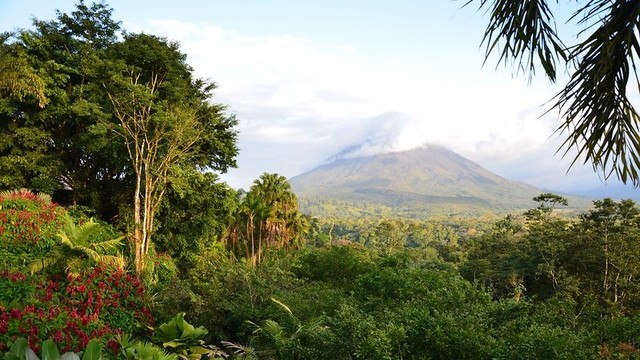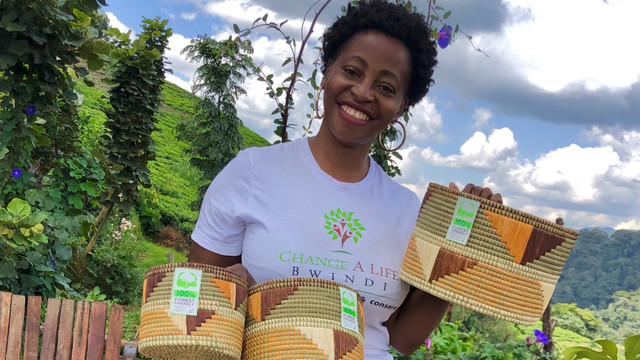100 years of Barbara Ward: IIED founder and champion of sustainable development
On 23 May 2014 the International Institute for Environment and Development marked 100 years since the birth of its founder, Barbara Ward.
A renowned economist with a deep concern for people and the environment, Ward was among the first to see the need to link development in Africa, Asia and Latin America with a concern for the global environment and the earth's diminishing resources.
Her work helped to define and establish today's widely accepted concept of sustainable development, and in March, she was honoured posthumously with a stamp in the Royal Mail's Remarkable Lives series, which celebrates ten extraordinary people who were born 100 years ago.
Also a prolific speaker and broadcaster, Ward was the first female foreign editor at The Economist and a governor of the British Broadcasting Corporation.
The world leaders who sought her advice included two US presidents, and several UK prime ministers and heads of state from Africa and Asia. Time magazine called her one of the 20th century's most influential visionaries.
"Our visionary perspective is the true realism – and that is what we must pursue," she once wrote.
In 1971, Ward founded IIED, a policy research organisation that now works in partnership with more than 100 organisations across the world to promote sustainable development and has helped to effect change at local, national and global levels. The institute is now helping to shape the global debates on climate change, natural resources, human settlements and sustainable markets.
"Barbara Ward's inspirational thinking and ideas remain at the root of IIED's purpose and activities today," said IIED director Camilla Toulmin earlier this year. "Her far-sighted vision, expressed so clearly four decades ago, continues to frame the agenda of today and tomorrow for us at IIED.
"Increasingly, her vision of a fair, just and sustainable world is driving the global debate on how we share the wealth of this beautiful planet so all our grandchildren can prosper.”
The institute played a key role in the Stockholm Conference of 1972, the Brundtland Commission of 1987, the 1992 Earth Summit and the 2002 World Summit on Sustainable Development. Indeed, when the Brundtland Commission sought to define sustainable development, it drew from Ward's landmark book with Rene Dubos, Only One Earth; Care and Maintenance of a Small Planet, that was published in 1972.
Even now, IIED regularly invites a significant figure within sustainable development to deliver the Barbara Ward Lecture, a series that was established in honour of her work. Previous special guests have included former Irish President Mary Robinson, Connie Hedegaard, European Commissioner for Climate Action, and Christiana Figueres, executive secretary of the UN Framework Convention on Climate Change. Plans are currently being finalised for the 2014 event.
From Oxford to the Old Vic
Born in Heworth, York, Ward’s family soon moved to Felixstowe. She attended a convent school before studying in Paris, including at the Sorbonne, before going on to Germany, and she ultimately gained a degree in politics, philosophy, and economics at Oxford University in 1935.
During the Second World War, she worked for the Ministry of Information and travelled in Europe and the US, becoming the foreign editor of The Economist and, although she left the magazine in 1950, she continued to contribute articles throughout her life.
Ward was also president of the Catholic Women's League and a popular panel member of BBC programme The Brains Trust, which answered listeners' questions. In 1946 she became a governor of the BBC and of the Old Vic theatre.
In 1950, Ward married Australian Commander Robert Jackson, an administrator for the United Nations. Although she continued to use her own name professionally and was not widely known as Lady Jackson, in 1976, when she was given a life peerage, she used her then estranged husband's surname for her title as Baroness Jackson of Lodsworth.
Ward passed away in 1981, and Pope John Paul II sent a Cardinal to represent him at Ward's requiem service. However, her legacy lives on through IIED.
"Barbara Ward was among the first to articulate the concept of sustainable development and what was needed to underpin it," said David Satterthwaite, a senior fellow at IIED who worked closely with Ward and has also been interviewed about his recollections. "Under her guidance, IIED became one of the first organisations to make the crucial connection between people and planet, a connection that still drives our work today."
Resources:
- Barbara Ward video compilation in her own words and those who knew her best
- Video interview with former IIED director David Runnalls
- Video interview with IIED senior fellow David Satterthwaite
- Georgetown University Library newsletter article on the papers of Barbara Ward (page two)
- US President John F Kennedy describes Barbara Ward as "our friend in freedom" in an address to Boston College, where Ward, also known as Lady Jackson, was to be awarded an honorary degree
- David Satterthwaite's book on Barbara Ward and the Origins of Sustainable Development



